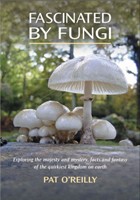Tricholoma cingulatum (Almfelt) Jacobashch - Girdled Knight
Tricholoma cingulatum (Almfelt) Jacobashch - Girdled Knight
Phylum: Basidiomycota - Class: Agaricomycetes - Order: Agaricales - Family: Tricholomataceae
Distribution - Taxonomic History - Etymology - Identification - Culinary Notes - Reference Sources
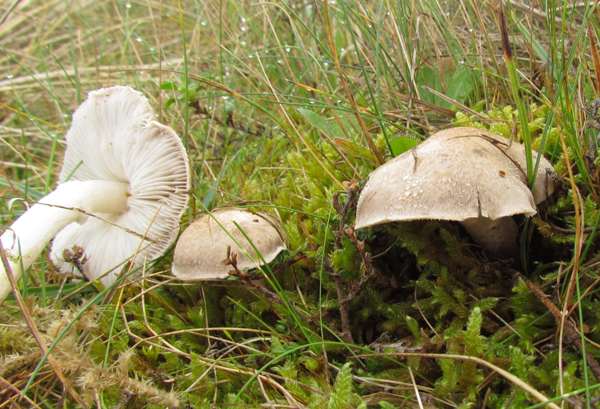
Although many greyish-brown Tricholoma fungi are difficult to identify from macroscopic characters alone, the Girdled Knight is not one of these. A finely scaly grey-brown cap plus a distinct ring on the stem are key features. Microscopically, it is unusual in having narrow oval spores, whereas most fungi in this genus have broader oval spores.
This mycorrhizal mushroom is found with various kinds of willows, including Dwarf Willow in the slacks on some sand-dune systems.
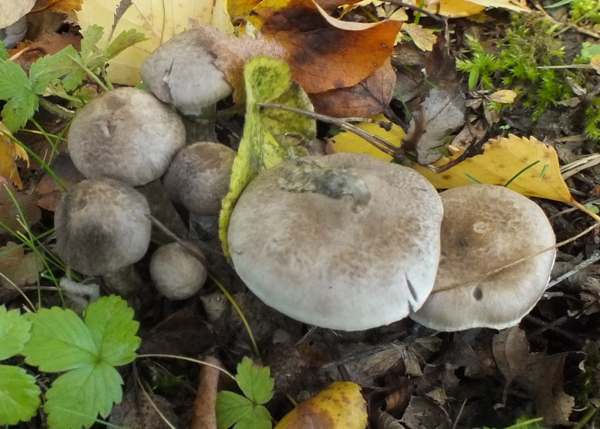
Distribution
In Britain and Ireland this is one of the less common of the 'knights', but it has been recorded in a number of locations in Scotland, Ireland, Wales and England, often in quite large groups. The Girdled Knight is quite common in Scandinavia, and it has been found also in Germany, France, Spain, Portugal, Italy and many other countries on mainland Europe.
Taxonomic history
The basionym of this species dates from an 1830 publication in Linnaea by Elias Magnus Fries wherein Amfelt's binomial scientific name for this species was recorded as Agaricus cingulatus. (In the early days of fungus taxonomy, most of the gilled mushrooms were included initially in the genus Agaricus, but the majority have since been relocated in newer genera to leave only the 'true mushroom' in the Agaricus genus.)
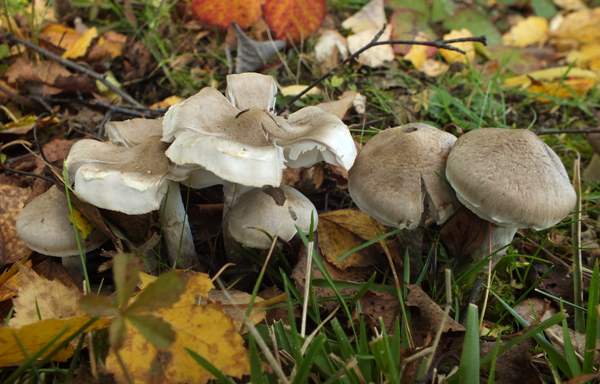
The currently-accepted scientific name Tricholoma cingulatum dates from an 1890 publication, wherein E. Jacobashch (about whom I have no biographical information other than publication dates... can you help?) transferred this species to its present genus.
Synonyms of Tricholoma cingulatum include Tricholoma ramentaceum, Armillaria cingulata (Almfelt) Quél. and Agaricus cingulatus Almfelt ex Fr.
Etymology
The generic name Tricholoma means 'with hairs on the edge', which refers to the rim of the mushroom and is true of only a tiny minority of species (the knights) in the Tricholoma genus.
The specific epithet cingulatum means 'with a girdle, belt or collar'.
Identification guide
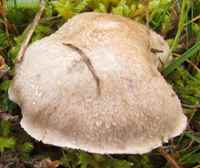 |
Cap Convex at first, expanding with a slight umbo; pale grey or grey-brown, covered in fine grey-brown felty scales; initially roundish but often becoming irregular with a slightly wavy margin when mature; 3.5 to 6cm across. |
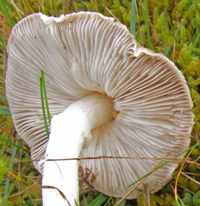 |
GillsWhite, emarginate; moderately spaced. StemWhitish with a woolly or cottony ring; cylindrical; 5 to 8cm long, 8 to 12mm diameter. |
SporesEllipsoidal, smooth, 5-6 x 2.5-3.5µm; inamyloid. Spore printWhite. |
|
Odour/taste |
Taste and smell slightly mealy. |
Habitat & Ecological role |
Mycorrhizal, nearly always found with willows; sometimes in dune slacks with Dwarf Willow. |
Season |
June to October in Britain and Ireland. |
Similar species |
Tricholoma sciodes is similar but does not have a stem ring. |
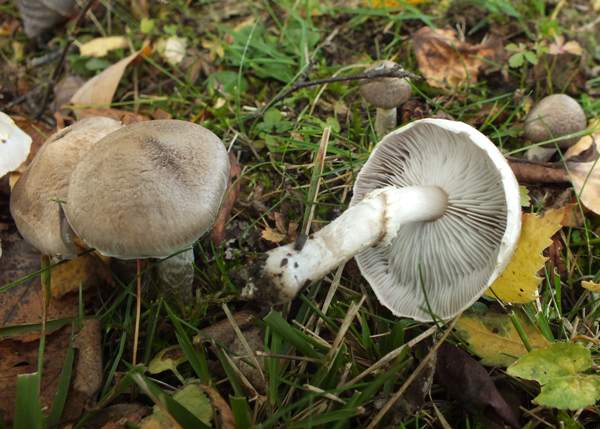
Culinary Notes
Tricholoma cingulatum is recorded as edible in many field guides, but care is necessary to avoid confusion with any of the slightly poisonous greyish Tricholoma species that can cause stomach upsets. It is easy for beginners to confuse this species with deadly poisonous pallid mushrooms such as Amanita virosa, and so we cannot recommend the Girdled Knight as a culinary collectible for anyone but the most experienced and capable of fungi foragers.
Reference Sources
Fascinated by Fungi, 2nd Edition, Pat O'Reilly 2016, reprinted by Coch-y-bonddu Books in 2022.
Kibby, G (2013) The Genus Tricholoma in Britain, published by Geoffrey Kibby
British Mycological Society, English Names for Fungi
Dictionary of the Fungi; Paul M. Kirk, Paul F. Cannon, David W. Minter and J. A. Stalpers; CABI, 2008
Taxonomic history and synonym information on these pages is drawn from many sources but in particular from the British Mycological Society's GB Checklist of Fungi.
Fascinated by Fungi. Back by popular demand, Pat O'Reilly's best-selling 450-page hardback book is available now. The latest second edition was republished with a sparkling new cover design in September 2022 by Coch-y-Bonddu Books. Full details and copies are available from the publisher's online bookshop...
